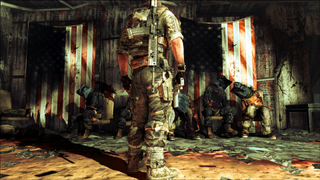Spec Ops: The Line writer 'would eat broken glass' before considering sequel
"It was a brutal, painful development."

Yager's Spec Ops: The Line was as brutal as it was brazen, but was ultimately a commercial failure. This fact alone is enough to rule out a sequel, however its lead writer has spelled out some other reasons the 2012 shooter won't be revisited.
In response to one Twitter user's query about why Spec Ops: The Line won't get a sequel, Walt Williams responded rather explicitly: "Because it was a brutal, painful development and everyone who worked on it would eat broken glass before making another. Also it didn't sell."
Because it was a brutal, painful development & everyone who worked on it would eat broken glass before making another. Also it didn't sell.October 3, 2017
Yager has made clear its thoughts on returning to Spec Ops: The Line in the past, but never with such conviction as Williams, whose recent book about the games industry, Significant Zero, explores the development of Spec-Ops and other games in raw detail.
Which is a shame, because Spec Ops: The Line is a good game for reasons I don't want to spoil. Instead, here's an excerpt from Samuel's Why I Love column last year:
Spec Ops is essentially an adaptation of Heart of Darkness, as the name John Konrad suggests. Heavier inspiration comes from Apocalypse Now, itself an adaptation of the same work. In all versions of this story, the protagonist is sent to track down a colleague who has gone off the reservation.
That journey takes them through a strange land, where the circumstances and environment become stranger the closer the hero gets to their target, a process represented perfectly by the river in both the book and Apocalypse Now. The quarry in each story is found to be playing god over their new domain, succumbed to a form of madness created by the circumstances of their surroundings.
Cheers, Videogamer.
The biggest gaming news, reviews and hardware deals
Keep up to date with the most important stories and the best deals, as picked by the PC Gamer team.
Update: For the sake of clarity, Williams underscores the above is him being hyperbolic, and that more about the development of big budget games can be gleaned from his book Significant Zero.
Just to be clear, this is hyperbole. There's only so many times I can say "It didn't sell; we moved on."https://t.co/YPPH25lqP8October 4, 2017
Most Popular







